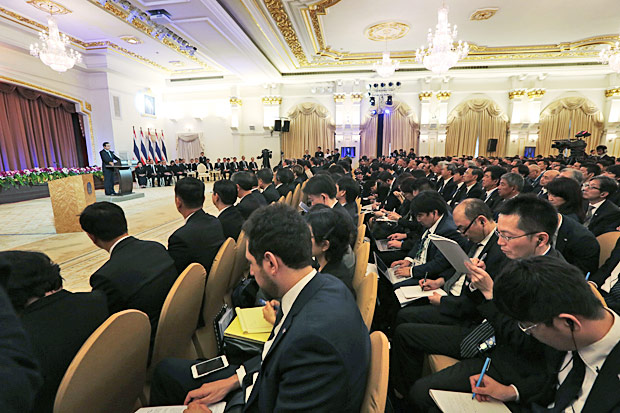
Prime Minister Prayut Chan-o-cha has urged Japan to ramp up investment in Thailand as ongoing national reforms underscore the importance placed on keeping government policy consistent and transparent in the interests of stability.
Gen Prayut was speaking Monday to a gathering of 570 investors from Japan led by Japanese Minister of Economy, Trade and Industry Hiroshige Seko.
"When you return home, please consider investing [in Thailand] this year. This year, the country is in a transitional period and undergoing reform," Gen Prayut said.
"The government has emphasised the importance of transparency and has pursued policies aimed at encouraging investment in the Eastern Economic Corridor [EEC] as well as investment in major infrastructure projects," the prime minister said.
Gen Prayut went on to say the government has devised plans to develop the EEC into a series of new economic zones featuring upgraded technology based on an estimated 600 billion baht infrastructure investment plan.
The EEC is the government's flagship policy to create special economic zones spanning 30,000 rai in the three eastern provinces of Chon Buri, Rayong and Chachoengsao.
It is promoting investment in 10 targeted industries: next-generation cars; smart electronics; affluent, medical and wellness tourism; agriculture and biotechnology; food; robotics for industry; logistics and aviation; biofuels and biochemical; digital; and medical services.
The government has promised to go ahead with the EEC and the project will continue even after an elected government comes to power because it has been stipulated in the law, Gen Prayut said. A general election is expected between September and December next year.
The five-year economic plan and national development roadmap will continue under the 20-year national development strategy, the premier added.
"I confirm that any future elected government must carry on with this EEC project consistently because it is stipulated in the law and in the legally binding 20-year national strategy. It is also covered by the national economic and social development plan for the next five years," Gen Prayut said.
During the first five years, major projects will include one to improve U-Tapao International Airport to increase its annual passenger-handling capacity to 5 million, up from 3 million now, and to 60 million in 2032.
Other include dual-track rail and hi-speed rail projects; the phase 3 development project for the Laem Chabang deep-sea port; a phased development project for Map Ta Phut port; the Sattahip commercial port development project; the construction of three motorways; and a project to develop tourism and human resources.
Gen Prayut said infrastructure investment projects will give the private sector an opportunity to co-invest under the public-private partnership (PPP) scheme, while the fast-track PPP plan will shorten the implementation process from two years to nine months.
Last year marked the 130th anniversary of diplomatic ties being established between Thailand and Japan.
"Today, I assure you with all my heart that I will do all I can to strengthen the trust between Thailand and Japan for our mutual benefit," Gen Prayut said. "It must be win-win in terms of trade and investment."
He wrapped up his speech by praising Japanese cuisine.
Mr Seko said Japanese investors were looking forward to visiting the EEC.
He said Thailand has become a hub in Asean while Japanese industries have their production bases in the country.
Japanese firms have established centres to develop technologies and innovation in Thailand, he added.
For some, their factories here outsize those in Japan, he said, adding that Japan and Thailand should work together to upgrade their industries.
Hiranya Sujinai, secretary-general of the Board of Investment, said Japan is the top foreign investor in Thailand, accounting for 40% of the total. Japan is the second largest trade partner after China, he said.
In the first half of this year, Japan submitted the most applications to the Office of the Board of Investment (BOI). It accounted for 55% of total foreign investment, or 65 billion baht from a total of 120 billion baht.
Applications for hybrid vehicle investment projects were worth 19.54 billion baht, while those for special polymer projects were valued at 15.15 billion baht, Mr Hiranya said.
Kalin Sarasin, chairman of the Thai Chamber of Commerce and Chen Namchaisiri, chairman of the Federation of Thai Industries, on Monday signed a memorandum of understanding with the Japan Business Federation, also known as Keidanren, and the Japan Chamber of Commerce and Industry to support the 10 targeted industries.